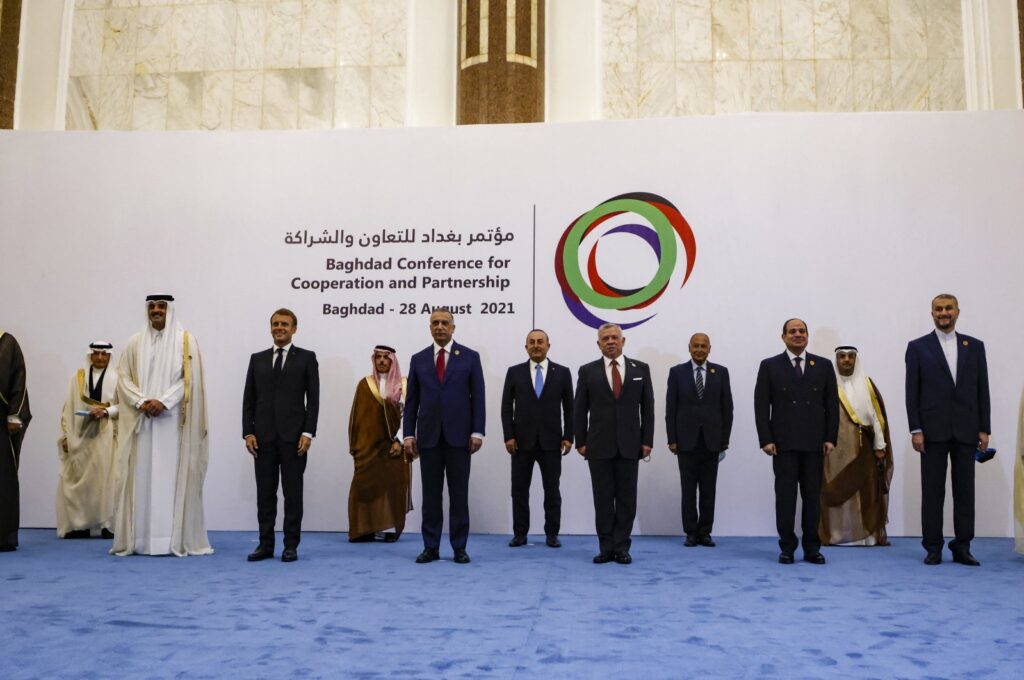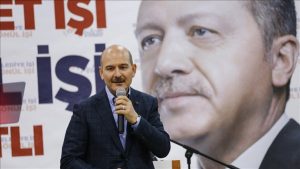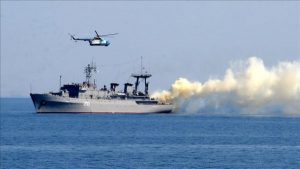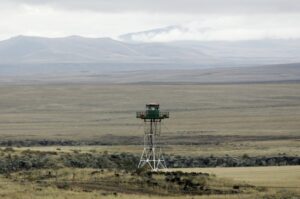Opportunities, challenges before Turkey’s regional détente
The year 2021 saw Turkey seeking warmer ties with several regional countries and long-time foes after many tumultuous years. Experts underline that the lack of commitment from the… …

The year 2021 saw Turkey seeking warmer ties with several regional countries and long-time foes after many tumultuous years. Experts underline that the lack of commitment from the new United States administration to the Middle East, the COVID-19 pandemic and the Al-Ula summit paved the way toward regional normalization.
“COVID-19 has been a big factor contributing to certain Arab states’ decisions to dial down tensions with rivals and competitors in the Middle East,” Giorgio Cafiero, CEO of Gulf State Analytics, a Washington, D.C.-based geopolitical risk consultancy, told Daily Sabah, “With economies suffering from the pandemic, there is a desire in Arab capitals to make foreign policy conduct less costly while putting greater emphasis on the pursuit of more economic, trade and investment cooperation.”
Speaking to Daily Sabah, Dr. Ali Bakir, senior researcher at Ibn Khaldon Center and assistant professor at Qatar University, said that a new administration in Washington, reconciliation efforts in the Gulf Cooperation Council (GCC) and a mutual interest in investing in the de-escalation moment in the post-pandemic era, led to new dynamics in which “an advancement in the bilateral relations of any two players is an additional stimulus for the rest of the regional players to follow the same path.”
“There is a general understanding that continuing the fight in a de-escalation moment is counterproductive.”
Converging interests have driven regional power shifts in the Middle East, mainly led by regional powerhouses Turkey and the United Arab Emirates (UAE). Abu Dhabi Crown Prince Sheikh Mohammed bin Zayed Al Nahyan (MBZ) visited Turkey for the first time since 2012 in November. Similarly, Ankara and Cairo have recently exchanged positive signals in an attempt to restore relations after more than seven years of political estrangement. In May, a delegation of senior Turkish officials traveled to Egypt for an official visit – the first since 2013 – to discuss normalizing diplomatic relations amid efforts by the two countries to improve ties that deteriorated following the Arab Spring – the move was reciprocated by a second round in Ankara. Turkey has called on Egypt to cooperate in the Eastern Mediterranean, saying a maritime deal with Ankara would be more beneficial for Cairo then one with Greece. Moreover, Ankara and Riyadh have in recent months attempted to repair some diplomatic damage after a decade of tension, especially after the 2018 murder of dissident Saudi journalist Jamal Khashoggi in Saudi Arabia’s Istanbul consulate. Aside from the Khashoggi incident, Saudi Arabia’s rapprochement with Israel, support of the coup in Egypt and its stance on Libya and Syria have been other points of contention.
After years of looking abroad for answers, countries in the Middle East now appear to instead be talking to each other to find solutions following two decades defined by war and political upheaval.
The diplomatic maneuvering signals a growing realization across the region that America’s interest is moving elsewhere and that now is the time for negotiations that were unthinkable just a year ago.
“Countries such as the UAE and Saudi Arabia have seen the limited gains (that) they have been able to achieve from their hawkish foreign policies, underscored by the situations in Libya and Yemen, plus the failed effort to pressure Qatar into changing its foreign policy with an unprecedented blockade. These realizations have led to Abu Dhabi and Riyadh becoming increasingly exhausted,” Cafiero stressed.
Erdoğan and MBZ, who is seen as the de facto leader of the UAE and the force behind its foreign policy posture, oversaw the signing of nearly a dozen cooperation deals during the visit, while a top Emirati official said the UAE has earmarked $10 billion for investment in Turkey. The president will pay a return visit to the UAE in February.
Obstacles persist
While the domains of economics, trade, energy and investment are where there is the most potential for bilateral cooperation between Turkey and the UAE, Cafiero warned that Ankara and Abu Dhabi could be expected to remain on different pages with divergent perspectives when it comes to more delicate and sensitive political issues.
“How well these two capitals can manage, as opposed to escalate, such tensions will be important to monitor in 2022 as the relationship between Turkey and the UAE continues to thaw.”
He said that the situation in Libya could challenge Turkey and the UAE’s efforts to improve bilateral ties.
“The state of Libyan affairs is highly uncertain as we begin 2022, but if the North African country relapses back into armed conflict there could possibly be a return to higher levels of tension between Ankara and Abu Dhabi.”
Long-awaited elections as part of a political process overseen by the United Nations expected to be held on Dec. 24 were postponed, raising doubt about the North African country’s future after a decade of violence and civil war.
“The actions taken by Khalifa Haftar and his Libyan and non-Libyan supporters in early 2022 will matter greatly when it comes to questions about Abu Dhabi’s next moves in relation to Libya,” Cafiero added. The warlord, Haftar, had previously launched a campaign to overthrow the United Nations-backed government in the capital Tripoli – a campaign strongly backed by the UAE and Egypt.
Bakir, on the other side, highlighted that the current rapprochement efforts offer vast opportunities for all involved parties especially on the economic level where everyone is trying to compensate for the high costs of the rivalry in the previous period as well as the financial losses due to the pandemic era.
“Given that the regional threats will not disappear any time soon, the normalization process opens new doors for security and defense cooperation with the (involved) countries. The overall outcome is a relatively stable and prosperous region,” he said.
“Regional threats require that regional players cooperate in order to create stability and security. Turkey and Qatar have been playing a significant role in ensuring stability, security and prosperity in the region.”
Bakir indicated that the main challenge in the process remains how the current normalization between the different players can lead to a sustainable relationship between the several players, and how to create mechanisms that allow for such relations to continue smoothly even when political disputes arise in the future.
New Mideast reassessment
The American withdrawals from Afghanistan and Iraq have played a part in the change in the region. Once ostracized autocracies such as Bashar Assad in Syria, and shunned former top figures such as Moammar Gadhafi’s son in Libya, are back in the political arena amid the still smoldering ruins of the 2011 Arab Spring uprisings. The Arab countries’ aim to normalize with Assad could pose another challenge to enhanced relations with Turkey as Ankara opposes reestablishing ties with the dictator.
Syria’s Assad has clawed his way back from the precipice. Though the northwestern Syrian province of Idlib remains under the control of opposition forces, Assad controls the rest of the country.
“Against the backdrop of the current situation in Afghanistan, the Trump administration’s lack of a response to the September 2019 Aramco attacks and other developments, a host of Arab states are calling into question the wisdom of remaining so dependent on the U.S. as their security guarantor,” Cafiero added.
“Such dynamics have pushed a number of regional states to begin exploring opportunities for improved relations with other countries in the region, including foes and adversaries.”
Much remains unsettled and this inward search may not provide the answers most want.
The United States still maintains a strong military presence, including bases across the wider Mideast. But its allies also watched in stunned horror as desperate people clung to the sides of departing U.S. military cargo jets during America’s chaotic withdrawal from Afghanistan after 20 years of war and the Taliban takeover of the country.
And with the border-locking chaos of the coronavirus pandemic largely behind them, Mideast leaders are now shuffling, talking face-to-face amid a flurry of diplomatic meetings, seemingly eager to hedge their bets.
An intra-Gulf feud that saw Qatar boycotted for years by four Arab countries ended in January at Al-Ula.
The closing of ranks also brought a return of realpolitik to the region, a decade after the Arab Spring movements that aimed to topple the region’s autocrats.
This new Mideast reassessment however, appears to have limits on what it can resolve.
The Mideast hasn’t rushed to embrace Taliban rule in Afghanistan and international recognition is still far off. Turkey has argued that engagement with the Taliban administration is vital for the humanitarian situation in the country. The grinding civil war rages on in Yemen, where a Saudi-led coalition battles Iranian-backed rebels. In Lebanon, the Iran-Saudi rivalry threatens to tear the country apart even more and this rivalry extends to the Eastern Mediterranean.
But the talking, for now, continues. And absent a major crisis that could draw America in again, those conversations likely will be where the deals get done.











